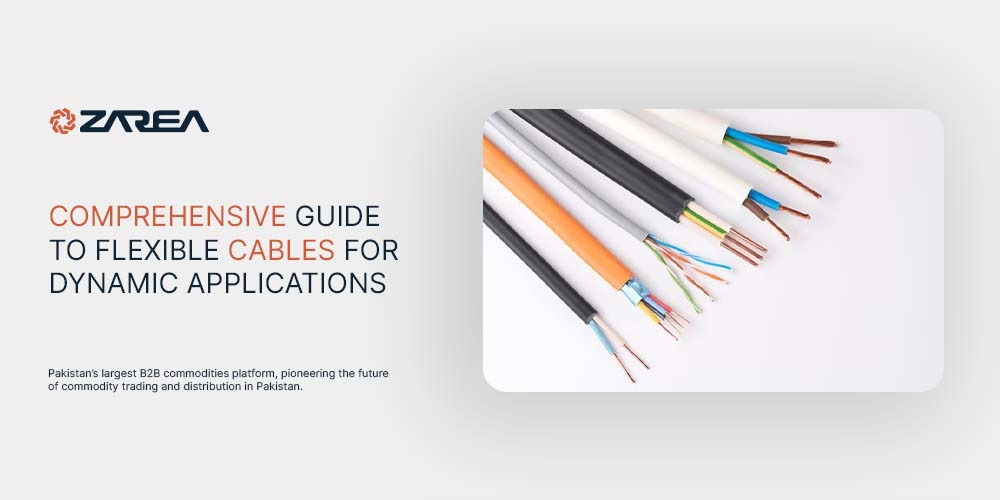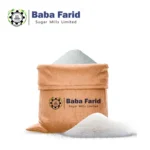Introduction – Flexible Cables:
A flexible cable, in some instances referred to as a flex cable or flexible conductor, is a type of electrical cable designed for drag chain systems or applications that require flexibility and durability for frequent bending, twisting, or movement. At Zarea, Pakistan’s largest B2B commodities platform, pioneering the future of commodity trading and distribution in Pakistan, we understand the essential role that flexible cables play. Our platform ensures that every contractor, engineer, and buyer has access to top-grade bendable cables that meet the rigorous standards of modern infrastructure projects.
Comparing Cable Types: Flexibility Matters:
Cable selection is a critical decision in any project involving electrical installations. The choice between stranded cables and bendable cables is particularly crucial, as each offers distinct benefits. Stranded cables, typically composed of several small wires bundled together, offer a moderate degree of flexibility and are suitable for installations where some movement or bending is involved.
However, for applications requiring more frequent bending, high durability, and superior flexibility—such as moving machine parts or robotic arms—flexible cables are preferable. Zarea provides a wide range of both types, ensuring that whether you are wiring a stationary office or a dynamic manufacturing floor, you have the right cable for the job.
Choosing the Right Size for Flexible Cables:
The selection of appropriate cable size is important not only for ensuring the effectiveness of an electrical installation but also for preventing possible hazards. A flexible cable is selected depending on the current-carrying capacity, overall cable route length, and surrounding environmental conditions. Zarea provides comprehensive guidance and consulting to allow customers to pick the size of a cable best for a particular purpose or function that would be most compatible with safety, compliance issues, and even cost implications.
For those interested in exploring further, particularly in the realm of wiring cables, we invite you to read our detailed blog on electric wiring cable specifications and applications. This resource is designed to help you make informed decisions about your wiring needs, complementing the extensive product listings available at Zarea.
Versatile Uses of Flexible Cables in Modern Applications:
Flexible cables find application in various industries for different purposes. Their capacity to endure severe bending and twisting makes them perfect for use in locations where regular cables could break. Common applications include mobile power supplies, connecting moving parts of machinery, and in data and communication fields where flexibility helps in the installation of cables in tight spaces. Zarea’s inventory includes flexible cables that are perfect for these uses, crafted to meet the highest standards of both functionality and safety.
Zarea’s Offerings: Top Flexible Cables:
We’re proud to offer a wide range of high-quality flexible cables from the best manufacturers.
Fast Cables Flexible Cables:
Newage Cables Flexible Cables:
- Newage Cables (Pvt) Limited 0.75mm
- Newage Cables (Pvt) Limited 1mm
- Newage Cables (Pvt) Limited 1.5mm
- Newage Cables (Pvt) Limited 2.5mm
- Newage Cables (Pvt) Limited 4mm
Each cable in Zarea’s range has undergone thorough testing to meet the high quality standards demanded by our customers. Our adaptable cables are created to provide exceptional performance and dependability for tasks ranging from construction sites to complex machinery installations.
Maintenance and Safety Tips for Flexible Cable Users:
Long life and reliability in flexible cables depend on being well cared for. This includes frequent visual inspections for wear, careful handling to avoid sharp bends, and adhering to manufacturer recommendations on installation and use. Safety is one of the most important features that deal with preventing electrical hazards like a short or fire. Zarea highlights the use of flexible cables, yet at the same time treated with fire-resistant materials for added security to our customers’ projects.
Conclusion: Why Choose Flexible Cables:
Choosing flexible cable from Zarea means opting for a partner who understands the nuances of construction materials and is dedicated to advancing the industry through technological innovation and superior service. Our commitment to sustainability and efficient resource use also ensures that every purchase contributes positively to the broader construction landscape of Pakistan.
As we continue to expand our offerings and reach, Zarea remains your trusted source for all construction material needs, empowering projects across Pakistan with the right tools and materials to succeed. Whether you’re building a new facility or retrofitting an old one, remember that flexible cables from Zarea are built to perform and engineered to last.
FAQs:
Where are flexible cables used?
Flexible cables are used in routing cables through trays, powering portable devices, and connecting equipment in renewable energy setups like wind and solar farms.
What is the difference between stranded and flexible cable?
Stranded cables are more flexible and better for frequent bending but can loosen at the ends over time. Solid cables are sturdier but can break if bent excessively.
What are the advantages of flexible wire?
Flexible wires are durable and cost-effective, designed to withstand repetitive movements and maintain consistent performance in compact spaces.
When to use flex cable?
Flex cables are ideal for connecting portable electrical devices and light fixtures, offering the necessary flexibility for easy and safe connection to power sources.
































